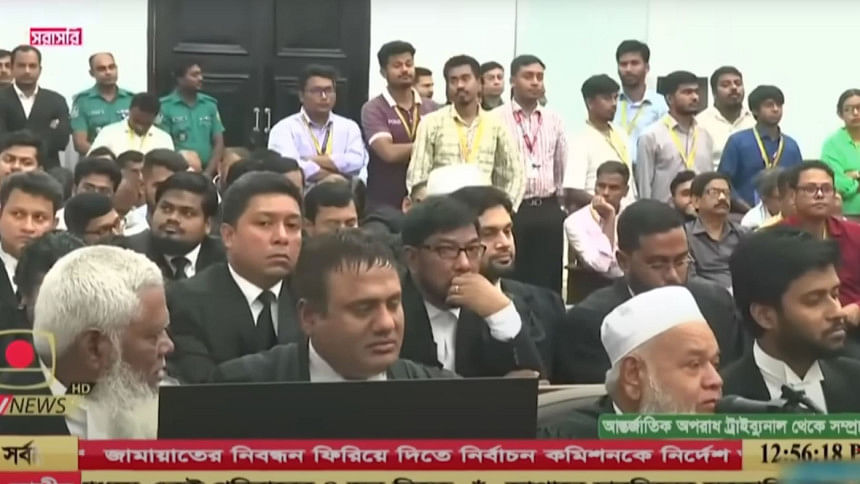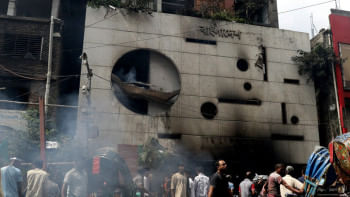The screen shows the trial, not the threat

For the first time in its history, Bangladesh has broadcast live the proceedings of a criminal trial. The decision to televise the International Crimes Tribunal (ICT) proceedings in the case filed against former Prime Minister Sheikh Hasina aims to change public perception. This sends the message that justice is not confined to shadowy chambers behind closed doors. It is meant to be seen, understood, and evaluated by the people in whose name it is served.
However, one of the immediate concerns emerging from this televised trial is the threat it poses to the safety of defence lawyers and the fairness of the trial. By broadcasting the proceedings, the identities and arguments of both prosecution and defence come into full public view. In an ideal democratic society, this visibility would simply be part of the judicial process. But in our reality, where mob mentality thrives on emotion, judicial processes are often misunderstood, and state protection is often delayed or remains absent, it poses a grave risk.
Let's be clear: each accused, regardless of the charges they face, has the right to a fair trial. That fundamental right includes access to legal representation. Defence lawyers, in upholding their duty, are not defending crimes; they are defending the rule of law. Trials are adversarial by design—justice only emerges when both sides are argued with equal force and clarity. Their arguments, questions, and courtroom posture, when broadcast, becomes part of the public record beamed across the country. While this might seem like a small detail in the quest for justice, it may carry potentially devastating consequences in a politically and emotionally charged environment like ours. Lawyers are not just legal professionals. They return home to their families after each day in court. When their work exposes them to the risk of violence, it is not just their safety at stake; it is the very foundation of our justice system.
We have already witnessed a worrying trend: mobs attacking lawyers and accused individuals within the court premises. These are not abstract fears; they are lived experiences backed by chilling examples. We have seen lawyers being chased, heckled, and even physically assaulted for defending clients. We have seen accused individuals being dragged from prison vans and beaten while in state custody, even within the proximity of courthouses.
In such a climate, what steps has the state taken to ensure the safety of lawyers involved in the particular ICT trial? Where are the guidelines, emergency protocols, and legal shields that would make this unprecedented transparency sustainable? What assurance does a lawyer have that arguing a controversial point in open court won't endanger their life outside it? What happens, then, when a defence lawyer must argue for something that runs counter to the popular narrative? This is not merely a question of personal safety; it's a question of institutional integrity. If lawyers are afraid to take on sensitive cases or present unpopular arguments, the courtroom becomes a stage of silence, not justice. With visibility must come responsibility.
Then there is the issue of public understanding. Legal proceedings are complex. Concepts such as "reasonable doubt," "lack of admissible evidence" or "procedural due process" are not easily digestible in soundbites. An honourable judge may dismiss an allegation based on insufficient evidence, not because the event didn't occur, but because the law demands proof beyond a reasonable doubt. Yet a layperson watching the trial might misconstrue this as a miscarriage of justice. Emotional reactions may follow.
Justice is not always emotionally satisfying. It is methodical, technical, and bound by rules designed to protect everyone until proven guilty. If the broader public cannot interpret this process within its rightful legal framework, then mass broadcasting without parallel civic education could stir more confusion than confidence.
More dangerously, it could create an ecosystem where mobs exert pressure on the judiciary. An honourable judge, knowing that millions are watching, might subconsciously feel compelled to deliver verdicts that appease public sentiment rather than follow the cold, hard dictates of the law. When justice bends to appease the crowd, it ceases to be justice. This is why state responsibility must not stop at the screen. The government, having taken this bold step towards judicial transparency, must now match it with equally bold measures for lawyer protection.
The intention behind broadcasting the ICT trial is noble. It signals a move towards a more open, democratic justice system. But we must ask painfully and honestly whether our institutions, political culture, and people are ready for it. Are we capable of listening to a defence lawyer without rushing to vilify them? Can we distinguish between legal argument and personal opinion? If the answer is no, then we are treading dangerous grounds.
As Bangladesh steps into this new era of judicial transparency, it must also commit to safeguarding the dignity, safety, and independence of all legal professionals.
Kollol Kibria is an advocate, human rights activist, and political analyst. He can be reached at [email protected].
Views expressed in this article are the author's own.
Follow The Daily Star Opinion on Facebook for the latest opinions, commentaries and analyses by experts and professionals. To contribute your article or letter to The Daily Star Opinion, see our guidelines for submission.

 For all latest news, follow The Daily Star's Google News channel.
For all latest news, follow The Daily Star's Google News channel. 





Comments